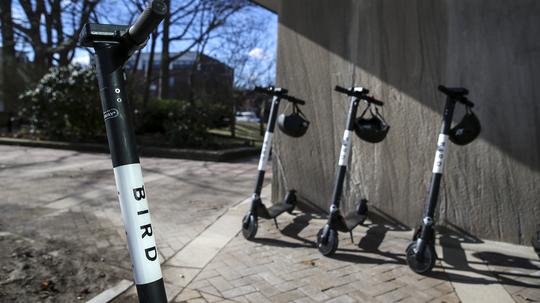
Dockless electric scooters may become a regular part of Wisconsin's transportation landscape now that Gov. Tony Evers signed a bill legalizing the controversial vehicles throughout the state.
Gov. Evers signed a bill on Monday that allows electric scooters to operate in Wisconsin as a way to expand transportation options for residents and attract startups to the state. The bill allows e-scooters to operate on most streets, sidewalks and bike lanes, and riders are required to follow traffic rules. The scooters must also satisfy equipment requirements, such as lighting and brake requirements.
"We should be setting the floor, not the ceiling, for local governments in Wisconsin," said Gov. Evers in a statement. "Electric scooters improve access to low-cost transportation options and can serve as a first or last-mile solution to residents and visitors in communities throughout our state. By providing clarity to a rapidly-growing industry, this bill empowers local governments to make the decisions that best fit their area."
The legalization will allow e-scooter companies like Lime, Jump and Lyft to begin operating in Wisconsin. Officials also expect Bird, the e-scooter company that was sued by the city of Milwaukee, to return to Milwaukee and launch in other Wisconsin cities.
Bird, based in Santa Monica, Calif., settled its dispute with Milwaukee on Monday, agreeing to pay the city $65,000, according to a press release. A portion of the settlement proceeds are slated to fund infrastructure investments to support e-scooters in Milwaukee as the city tests the mode of transportation in an e-scooter pilot. The pilot’s purpose is to determine how best to integrate e-scooters onto Milwaukee streets.
The pilot, overseen by Milwaukee’s Department of Public Works, was initially created in 2018 after lawsuits against Bird and its founder, Travis Vanderzanden, were filed. Last year, when Bird first introduced its dockless scooters to Milwaukee, the City Attorney’s office said the e-scooters violated state statute and were subject to a $98.80 citation if they were ridden on a city street or sidewalk.
The city later demanded that Bird remove its scooters from Milwaukee and pay $200 for every time the company allowed someone to rent an e-scooter in Milwaukee since June 27, 2018.
Milwaukee isn’t the only city that’s struggled with how to coexist with e-scooter companies, many of which are heavily venture-backed and growing quickly. Bird has raised $415 million since launching two years ago, and Lime raised $765 million, according to Crunchbase.
Other cities are also moving cautiously with e-scooters by taking a pilot program approach. Chicago is currently operating an e-scooter pilot in which it allows 10 scooter companies to participate. The four-month pilot aims to inform city officials on how to best regulate the new mode of transportation.
Pilot programs like these allow cities and scooter vendors to address safety concerns that stem from problems that have arisen due to scooter use, such as sidewalk clutter and the destruction of scooters.








